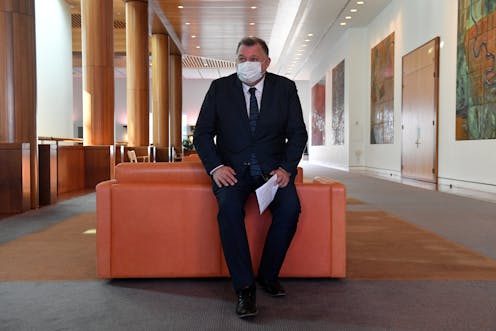
Earlier this month, many Australians received a text message prompting them to visit the “Australian Government’s COVID-19 Vaccines Adverse Events Report.”
It encouraged recipients to “click link uaptga.info” and informed them the message was “Authorised by Craig Kelly”, a former Liberal MP who has recently joined Clive Palmer’s United Australia Party as its leader.


The TGA’s legislative powers may need to be expanded to cover communications that are not strictly advertisements.
AAP/Dave Hunt
The text’s potential effects
Out of context, unexplained, and incomplete, the screen grabs are apt to mislead even a diligent reader of the material. But with millions receiving the text completely unprepared, it’s fair to assume that some, through no fault of their own, would draw false conclusions about it.
After all, there’s little to frame these data. Almost nothing indicates they are the unreviewed tally of notifications. And no disclaimer clarifies that the materials are silent on the all-important medical concept of causality.
Otherwise known as aetiology, this is the scientific study of how these events were caused. Such disclaimers, which actually do appear on the DAEN portal, had been mostly left off the screen grabs.
Even the footnotes that would usually help explain the meaning of each column’s contents had been excised from the screen grabs.
Read more:
How political parties legally harvest your data and use it to bombard you with election spam
The regulator’s response
The TGA responded to this appropriation of its database materials in two ways.
It first made a statement confirming its lawyers had written to Kelly and his party. But that statement confirmed that only copyright infringement allegations had been raised by the regulator, together with a demand Kelly stop sharing “incomplete extracts of DAEN reports” that “could be seriously misleading”.
Less significantly, the regulator temporarily pulled the DAEN’s PDF-generation capability.
Why can’t the TGA do more?
So why doesn’t the TGA have a clear legal pathway, other than perhaps under copyright law, to stop misinformation being communicated?
In short, it’s because the texts probably do not constitute advertising.
In 2018, the TGA’s powers to control communications about medicines were increased considerably. Several reforms clarified and expanded the regulator’s authority to take civil and criminal action against individuals unlawfully advertising therapeutic goods.
The powerful new laws were quickly used to stop unlawful advertising, with one case resulting in a $10 million fine.
In 2020, a review of the reforms found them to be largely effective and fit for purpose, with some tweaks. Some COVID-related recommendations were made, including that the TGA should consider “responding to non-compliant advertising with sanctions and penalties in a timely manner”. However, the review, perhaps unsurprisingly, did not indicate that the scope or meaning of “advertising” should be widened.

Read more














